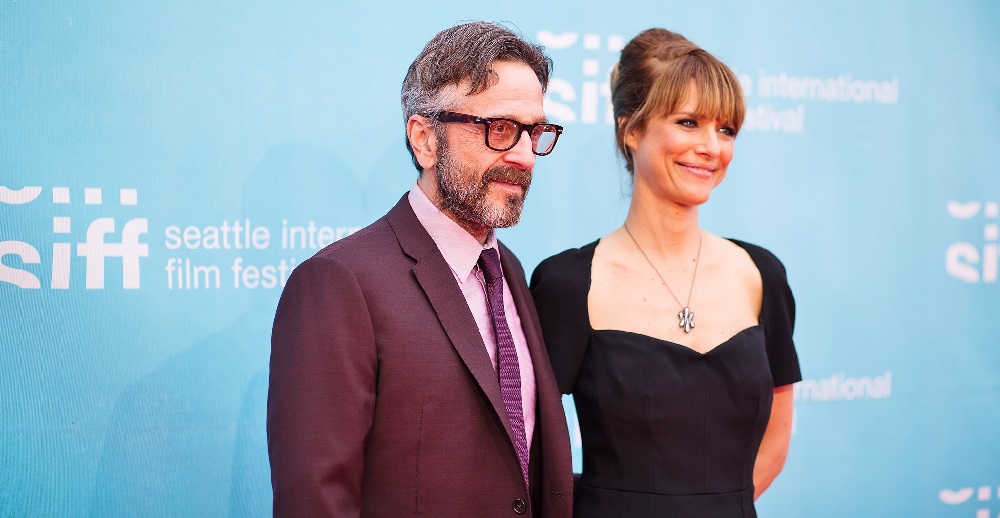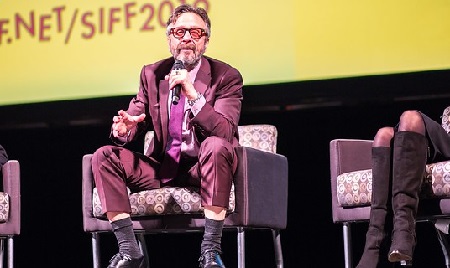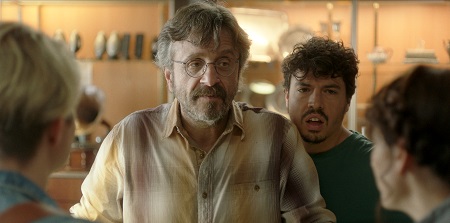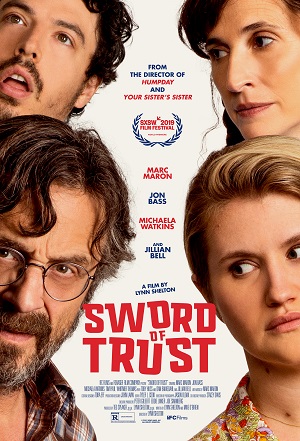
“Sword of Trust” – Interview with Marc Maron
by Sara Michelle Fetters - July 24th, 2019 - Film Festivals Interviews
a SIFF 2019 interview
Navigating from a Personal Point of View
Marc Maron on comedy, podcasts, politics and making Lynn Shelton’s Sword of Trust
Marc Maron has had quite the wild ride. He started his career at the fabled Comedy Store in Los Angeles before quickly moving to New York City. After unsuccessfully auditioning for “Saturday Night Live,” he still managed to catch the eye of David Letterman, becoming a frequent guest on his late night talk show. He has appeared on “Late Night with Conan O’Brien” over 40 times, hosted “Comedy Central’s Short Attention Span Theater,” did voiceover work on “Dr. Katz, Professional Therapist,” could be seen angrily screaming at the band Stillwater as they drove away in Cameron Crowe’s Almost Famous and was regular on left-wing radio network Air America for over five years in the 2000s.

In 2009 Maron began hosting the podcast “WTF with Marc Maron” where it almost instantaneously became a giant smash. Interviewing guests out of his garage in the Highland Park neighborhood of Los Angeles, his show has included a variety of eclectic guests, including a surprise visit by President Barak Obama in 2015. The comedian also starred in the hit television series “Maron” for IFC television where he portrayed a fictional version of himself, has written (or co-written) three best-selling books, released five comedy albums and recorded six comedy specials, all the while continuing to perform to sold-out audiences throughout the world. Since 2017 he has also played a central role in the Netflix ladies wrestling series “GLOW,” receiving a Screen Actors Guild nomination for Outstanding Performance by a Male Actor in a Comedy Series in 2018.
Now Maron takes the starring role in writer/director Lynn Shelton’s (Your Sister’s Sister) latest ensemble comedic endeavor Sword of Trust. Playing Alabama pawn shop owner Mel, the character finds himself in the center of a madcap bit of lunacy involving a Civil War-era sword that might just prove that the South really won and a masterful historical cover-up has prevented the world from knowing the truth for over 100 years. Maron is joined in the film by Michaela Watkins, Jillian Bell and Jon Bass, the four of them given ample freedom by Shelton to improvise as they worked together to bring this eccentric little heartfelt gem to life.
The opening night feature at this year’s Seattle International Film Festival, I had the good fortune to sit down with Maron just a few hours before his motion picture’s gala premiere. Here are some edited excerpts from our wide-ranging conversation:
Sara Michelle Fetters: You’ve performed a number of times in Seattle. You actually have a performance at the Moore Theatre on September 7.
Marc Maron: I love Seattle. I’ve been coming here since the early ‘90s. I was married to a woman from Seattle for a little while. Seattle has always been great to me.
Sara Michelle Fetters: But this time you’re coming to Seattle to premiere a movie that you just so happen to be the star of. I imagine that’s something of a change. What’s this feel like?
Marc Maron: I honestly don’t know. I’ve never had anything like this happen. I’ve never been in a movie like this. We premiered it at South by Southwest and I’ve never seen myself like this. I’ve seen myself do so much, you know, but being up on a screen in front of a live audience is pretty exciting. So. it’s exciting. I’m excited to see the film again. And Lynn’s from Seattle. So that makes it even more exciting.
Sara Michelle Fetters: What is it about Lynn Shelton that makes her so great to work with?
Marc Maron: She did my podcast. I’ve watched many of her movies. She directed a few episodes of my show, “Maron”, on IFC. We’ve sort of built a relationship over the years. She’s very good at understanding me.
Lynn just has a good sense of who I am. She’s a fan and seems to like to work with me. So I trust her. Her instincts around almost everything I do as an actor, and as a comic, she just gets what it is I want to do. That led to this collaboration. Additionally, we’re writing a script together right now and she directed my last stand-up special. We just have this symbiotic relationship creatively. It’s great.
Sara Michelle Fetters: When you read the script, what jumped out at you in regards to Mel?
Marc Maron: We had been working on a movie together that we were going to make but hadn’t finished it. During that process Lynn came up with this idea and got obsessed with this idea of a pawn shop. Once we started discussing the idea, it couldn’t just be, “this guy works at a pawn shop,” and nothing more.
We had to figure out a backstory of why we end up there at the pawn shop. What is his dynamic with Lynn’s character? He’s not a broken man, but he is a broken-hearted guy. Mel’s life didn’t really pan out the way he thought it would. But he is still getting by even if his worldview is sort of dour.
I can relate to that stuff. We created the character to fit me. It was really just a matter of finding the frequency that Mel operated on.
Sara Michelle Fetters: I like that you bring that up because, to me, as an ensemble you were all able to find a similar frequency.
Marc Maron: When you’re improvising, you can sometimes feel that in the movie. Improvising has to have an organic flow to it because every take is different, and as we’re all sort of unfolding the story together in real time this flow is important. Everyone is also all so funny and so good. They’re all very capable actors and improvisers. It was always surprising. The events happened in the moment and I think that you can feel that.
Early on I was concerned that we might not get it right, because once people start improvising, and you start getting laughs, it can be detrimental to the character. When everybody found their groove and started to make the characters believable, that’s when it began to click. That was where it became possible for the audience to connect and empathize with each character.
Sara Michelle Fetters: Can it feel daunting? I mean, you’re sitting there doing these scenes with actors like Michaela Watkins and Jillian Bell, fantastic improvisers who I imagine can both just fly once they get going.
Marc Maron: Yeah. You’re right. They can. They’re incredible.
I’ve worked with Michaela before. I love her. We have this very strong, very natural connection. I had never met Jillian but she was great. Michaela and Jillian worked out their dynamic with incredible clarity, and they’re both also very, very funny. They challenge you to hold your composure and not start cracking up in the middle of a scene. But they also keep things grounded and real so that can keep you from taking things too far.
Sara Michelle Fetters: And then there is your relationship with Jon Bass’ character Nathaniel in the movie.
Marc Maron: I don’t know why, but he truly annoyed me in real life. [laughs]
Right when I met Jon that happened. We hung out one night and I instantly felt there was definitely a lot of truth to the dynamic between Mel and Nathaniel. We were already on the wavelength of our characters we’d be playing in the movie. I mean I like Jon, he’s a great guy, but it’s still sort of just like, stay over there on your side of the room. You’re a little annoying. [laughs]
Sara Michelle Fetters: As for the movie itself, was it hard to find the emotional center of this story? I mean, it can get pretty intentionally absurd.
Marc Maron: It can. True.
I think that in the middle of the movie you start to feel like, certainly with my character, his life sort of got away from him. He’s stuck in some way. Outside of the money, which is an obvious motivator, I think Mel responds to the idea of doing something exciting. Taking a risk and doing something a little weird. But there’s more to it than that. He wants to find out if he’s been judging all these different people correctly, He wants to throw himself into the middle of this situation because, why not? What does he have to lose?
There was that element, but there is also this sort of perverse fascination with Southern culture and Southern conspiracy theories from the perspective of an outsider who judges all of this quite harshly, probably deservedly so. To have an opportunity to get thrust into something like that was certainly part of the motivation of the character. It was also something I could relate to and tap into emotionally. It’s what made Mel fun to portray.
Sara Michelle Fetters: Same time, what was it like to be in Alabama making this movie? With your podcast, with the oftentimes political nature of your comedy, was shooting there a little strange?
Marc Maron: I don’t know. I find areas of the country like Alabama to be very charming. There’s a lot of great people there. But the reality is, I could be shot in Alabama. Alabama just passed a sort of theocratic draconian law [in regards to reproductive rights] that’s devastating to individual freedom. But there’s still good people down there. They’re just not running things.
It is easy to use “magical thinking” to mislead people. It’s a real problem. The fact that so many people are so willing to disregard facts, unwilling to use reason or to engage with those with different beliefs is a scary thing. The thought that people are that vulnerable to this type of stuff really makes you think. It’s unfortunate. Worse, it’s dangerous.
Sara Michelle Fetters: So what would you want to say to people who profess to believe these, “alternate facts”? How do you use the truth and actual, not made up facts to engage with them?
Marc Maron: I think that a lot of time people who are willing to do that, to let themselves believe these things, sadly there’s really no shaking them. It’s a type of thinking that comes from confidence mixed with ignorance. But magical thinking, in general, is something that humans are compelled to do because things work out when you think magically about traumatic events or whatever, and whether this sort of thinking works out for darkness or whether it works out for light it is still a dangerous way of packaging in your brain some a conclusive ending that can appear satisfying. But when that sort of thinking becomes dangerous to others? That’s not a good thing. Then it becomes a real problem.
Sara Michelle Fetters: As for you personally, could you have ever imagined you’d have this wild, crazy ride of a career?
Marc Maron: Not at all. No. I never could have. At a certain point I was sort of down. I was in trouble. But I persevered somehow. With the podcast, I think it was my specific talent for conversation and comedy coupled with good timing that just happened to allow things to work out. [The podcast] was an act of desperation that kind of evolved into a format that was really able to embrace everything I do, and I was able to do it on my own terms. That changed my life.
But no. I didn’t have any expectation. My expectations are never that focused and I never intend to future think in a positive way much. But things worked out. I worked hard and, when the opportunities came, I was ready for them. I don’t think anybody’s going to begrudge me for my place in my life at this point.

Sara Michelle Fetters: But is comedy harder now? With this cultural and political climate, is it more difficult to push buttons?
Marc Maron: I can only navigate all of that from my own personal point of view, what my feelings are and how I stand in relation to those things. Instead of speaking in a general voice or writing jokes that are detached from my experience, I try to speak from the viewpoint of my personal struggles and challenges whatever they might be. Like being a straight white male and what that means in relation to women and how we talk about things. I talk about my experience around that and usually that’s pretty funny.
But in terms of the climate right it is a little scary. There are people who hate you for who you are, in a general way, and they only go by their assumption about who you are without knowing anything about you. But that goes both ways. Fortunately, I’m not that huge a public figure or so famous where I still can’t do anything under the radar, and generally with my comedy I’ve developed an audience who, when they come out to see me, respect what I do in a general way. For everyone else, I try to do comedy in a relatively diplomatic way. I think I understand what’s going to trigger people one way or the other, and I try to give them a little bit of warning, when I can.
Sara Michelle Fetters: For Sword of Trust, what do you think the takeaway is? What do you hope audiences are talking about afterward?
Marc Maron: I find that it’s a pretty ridiculous movie in some ways. But it turns out that the comedy is so effective because it’s genuine, and you can feel that there’s a subtle warmth to the whole thing. That because these characters are so real.
I do think that the story itself is compelling, and I would hope it could trigger people to think about truth versus non-truth, as well as look at the South in a different way. But ultimately it’s sort of a sweet, funny movie about a bunch of odd characters who you do sort of connect with. You feel empathy for them. I hope audiences feel that.
– Interview reprinted courtesy of the SGN in Seattle




